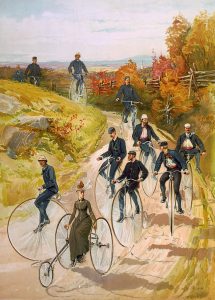Why everyone is standing up to the sitting-down problem
As your colleague stands during the weekly meeting or takes her sweet time to set up her movement-friendly computer/treadmill apparatus, *cue the eye-roll and audible collective boardroom sigh* think twice before asking her to just please calm down with the health bender.
 The world may just be ready for a new kind of work environment. And if it feels like the scene in the Lion King where Simba is running around singing about how he doesn’t want to be told what to do; No one saying do this, no one saying be there… Then you’re getting the idea. Because yes, Simba, we all can’t wait to be king either but here’s the kicker- sometimes the voices of the wise are worth a listen.
The world may just be ready for a new kind of work environment. And if it feels like the scene in the Lion King where Simba is running around singing about how he doesn’t want to be told what to do; No one saying do this, no one saying be there… Then you’re getting the idea. Because yes, Simba, we all can’t wait to be king either but here’s the kicker- sometimes the voices of the wise are worth a listen.
The medical experts are telling us to get ourselves up-and-at-‘em, out of the chair and around the mulberry bush during the workday. Or, as Bob would say, Get up, stand up. They don’t mean we should be facilitating sprint triathlons between meetings but they do expect a little more than what is put forth by the average Joe Accountant. The idea is that those who sit on their buttocks for long spreads of time throughout the day are exponentially more likely to incur otherwise preventable health issues than are those who lead a more active lifestyle. Those that are more mobile during the day, meaning those who spend most of their office hours on their feet, or bike saddle, generally have stronger bones, improved balance and coordination, and longer lifespans. Not to mention they would have a higher likelihood of a well-toned pair of stilts to strut around on.
And yes, the docs are solemnly swearing it’s not a cop-out. We all went there, to the ever-so-cynical thought that inactivity could be the perfect scape-goat for unexplained conditions. But in fact, remaining sedentary has been shown to lead to many horrors. Try this on for size; cardiovascular disease, type 2 diabetes and metabolic syndrome, clotting disorders, and even cancers, can come merely from a lack of physical bustle.
 Some folk though say, I got 99 problems and my waistline ain’t one because during lent they go to the gym and get quality jazz-ercise in before work in the mornings. Sorry Ms. Fonda, even though you probably look fantastic in your lycra, evidence suggests that those few-and-far-between spreads of vigorous exercise are actually ineffective in counteracting the problem. Exercise overall is excellent for health and wellbeing (including mental state) but it must be doled out steadily all day long instead of just pushing the limits of quantum biomechanics once a day before dinner. Think of it like eating 28 proportionate meals a week as opposed to all those 28 meals blended into one large, textured, smoothie after your pickup basketball game on Sunday afternoon.
Some folk though say, I got 99 problems and my waistline ain’t one because during lent they go to the gym and get quality jazz-ercise in before work in the mornings. Sorry Ms. Fonda, even though you probably look fantastic in your lycra, evidence suggests that those few-and-far-between spreads of vigorous exercise are actually ineffective in counteracting the problem. Exercise overall is excellent for health and wellbeing (including mental state) but it must be doled out steadily all day long instead of just pushing the limits of quantum biomechanics once a day before dinner. Think of it like eating 28 proportionate meals a week as opposed to all those 28 meals blended into one large, textured, smoothie after your pickup basketball game on Sunday afternoon.
If you need just one more nudge… regular physical activity can help to keep your thinking, learning, and judgement skills sharp as you age. That’s right; your skin isn’t the only part of you gaining proverbial wrinkles. Exercise can also reduce your risk of depression and may help you to snooze more peacefully. Research has shown that doing any intermittent level of correctly coordinated physical activity can boost you up when society (or gravity) has you down.
Seems like on my way home today I’ll be standing up on the tube and walking instead of taking the bus from the station! Imploring these ideas upon others from the comfort of my cushy desk chair, I realise I’ll certainly add on wanting to walk a further distance to lunch just to get my steps in. Happy exercising to all and to all, a good health.
– Written by Ria C. an American in London

